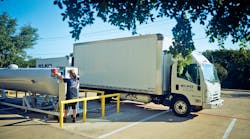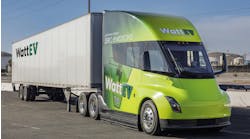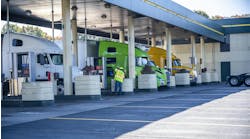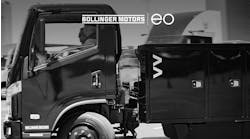Whether the driving factor is social pressure, government regulations, or simply to save money, fleets across the nation are considering alternative fuels. While electric vehicles are taking up most of the spotlight, they don't make sense for all freight-hauling applications. Some fleets are lowering their emissions with alternative fuels, such as propane, which doesn't come with the added headaches of EV implementation.
Electric passenger vehicles, for example, lose up to 20% of their range in cold weather. And an electric van fully loaded with cargo or an electric pickup hauling equipment can expect to lose significantly more.
"In the winter months, an electric vehicle might have an 80-mile range because of heating," Randall Jubb, president of Jubb's Bus Service in Maryland, told FleetOwner. "In the spring, the range might be 110, but when we get back to air conditioning … we're back to 80. We're 400 with a propane bus," regardless of the weather.
See also: Volvo to test VNR Electrics in extreme weather
But it isn't just cold weather that factors into a fleet's decision to go electric—it's also application. Don't expect that fully loaded electric cargo van and electric pickup that's maxing out its towing capacity to travel as far as estimated. A recent AAA study revealed the Ford F-150 Lightning lost 24.5% of its range when hauling 110 lb. less than its maximum capacity.
Then there's the issue of charging infrastructure and the myriad problems plaguing its development. Jubb said he's contracted with a county that tried to convert to an electric fleet but quickly realized the pitfalls. "We ain't cleaning up nothing with electric because they can't get it implemented," Jubb said.
Steve Whaley, director of autogas business development at the Propane Education and Research Council (PERC), told FleetOwner that electric vehicles certainly have their place. Still, he believes most businesses will eventually employ a "blended" fleet of vehicles. And some of those fleets could greatly benefit from propane autogas as an alternative fuel of choice.
See also: It's time to focus on EV infrastructure
Propane autogas compared to diesel
Propane autogas, also known as liquefied petroleum gas (LPG), is considered a near-zero emission energy solution. It's a clean-burning fuel widely available thanks to its U.S. production. According to PERC, propane autogas produces 43% less greenhouse gas emissions than grid-generated electricity, and a West Virginia University study showed that propane autogas produces significantly lower emissions than diesel. The study concluded that NOx emissions were 15 to 19 times higher in a diesel-fueled bus and that NOx was reduced by 95% in a propane-fueled bus.
Furthermore, according to The State of Sustainable Fleets 2023 Market Brief from clean-energy consultants Gladstein, Neandross & Associates, "propane engines on the market today already meet the stringent new engine emissions levels of EPA's Clean Trucks Plan and California's Low NOx Omnibus." That alone is enough to pique the interest of fleet owners facing these strict regulations, along with the national average cost per gallon of diesel fuel at $4.24 compared to propane, which consistently hovers around $1.50. Then there are the significantly higher costs to maintain diesel vehicles versus propane autogas vehicles.
See also: 'Sunset of the Diesel Era' is upon us, study finds
Fleets finding maintenance benefits
There are other upsides to powering a fleet with propane—one being emissions-associated maintenance.
Whaley said that because propane is a clean-burning fuel, it doesn't require diesel exhaust treatment like diesel engines. Fleet and maintenance managers agree.
"There are a lot of hoops you have to jump through with diesel due to all of the EPA emission standards," Bruce Thomas, master technician at Adams 12 Five Star Schools, explained. "New EPA-certified diesel buses have become much more expensive and difficult to maintain. For our district, the up-front costs have increased substantially just for equipment to pass newer emission standards."
Thomas, whose district fleet includes 148 buses—8% of which run on propane autogas—added that when it comes time to purchase additional buses, propane autogas is a safe bet.
Propane autogas vehicles are "ideal on day-to-day routes. They're quiet, clean, and environmentally friendly—a hands-down winner," Thomas said.
Elisa McAbee, owner of McAbee Trucking in North Carolina, said one of the best benefits of running a fleet on propane is the maintenance.
"Maintenance is a no-brainer now," McAbee told FleetOwner. "I spend very little on maintenance. All I do is change the oil filter, air filter, change the oil, the brakes, and it is, probably, a quarter of the cost of regular maintenance on diesel."
Tippecanoe School Corp., a district with five propane autogas vehicles in its fleet, has had a similar experience. Alan Fidler, TSC's certified master truck technician, said, "We've only had to perform routine maintenance on the propane autogas-powered buses. It's been much easier than working with diesel because of all the emission controls on new diesel engines, which seem to have a lot of problems."
Further, because propane autogas vehicles use internal combustion engines, maintenance operations, although requiring less frequent service intervals, are quite similar to diesel and gasoline maintenance operations.
"We service both our propane and diesel buses in the same area," Fidler explained. "We didn't have to add any special equipment or make any adjustments to the maintenance shop for the new propane autogas buses. It was a very turnkey process."
Jubb, who runs 35 propane vehicles in a fleet of 84, is so pleased with the ease of maintenance and performance of his propane vehicles that he plans to purchase more.
"My best guess is that maintenance is 35% less cost-wise over the course of a 12-year lifespan," Jubb said, comparing the cost difference of propane autogas versus diesel.
See also: Best practices for propane vehicle maintenance
Setting up fleet fueling infrastructure
But perhaps one of the more superior aspects of propane compared to other alternative fuels is its infrastructure, and Whaley explained this further. He said fleets can install an on-site 1,000-gallon tank on a skid with a dispenser and card reader, which takes up the size of a single parking space, for $50,000. This system accommodates up to 20 propane-fueled vehicles, and often, the fleet won't even have to pay that $50,000 upfront.
"The best part about propane is to have a fuel cost that's less—and it's great for it to be clean—but infrastructure is so inexpensive, and the providers (basically) give it away so they get a fuel contract with the fleet," Whaley said.
Whaley explained the fleet wouldn't have to wait long for its propane tank; most fuel providers have the tanks and dispensing systems in stock. The provider will send the tank on a truck, slide it off, plug it up, and it's ready to go. The whole system requires about 220v to 30 amp circuit of electricity to run, equivalent to what a clothes dryer uses.
"I have my own fueling station at my lot, so the fuel availability is right there," McAbee said. Where the drivers park, that's where they fuel, she said.
This setup makes obtaining fuel permits the most time-consuming aspect of running a propane-powered fleet. But Whaley explained even that doesn't take long, as the EPA doesn't regulate propane. This is because, unlike how diesel and gasoline contaminate the ground when spilled, propane simply evaporates, preventing contamination.
Whaley explained further that fuel contractors bundle the cost of an on-site propane tank and dispenser into the fuel price. He said fuel providers would work with the fleet to lock in that fuel price for several years, adding stability to a fleet's budget.
One fleet was even able to decrease its driver shortage, Whaley explained,. The fleet rolled its fuel savings into the operating budget, "and they used that savings to pay their drivers more, so they had first dibs on all the drivers," Whaley said.
McAbee told FleetOwner she saved $40,000 last year on fuel costs alone. She's since doubled the number of propane trucks in her fleet and expects to save $80,000 to $90,000 this year.
McAbee's advice to fleet owners who are looking to implement alternative fuels into their fleet is to not just consider it, but do it.
"Get different fuel options, get alternative fuels," she said. "The impact we make on our environment is the legacy we leave."
As Whaley stated above, electric vehicles have their place in the industry, but perhaps the key to lowering emissions across the board is diversifying fuels and employing vehicles of differing powertrains in fleets to get the job done most efficiently. And why not start with a fuel whose infrastructure is at the ready?




